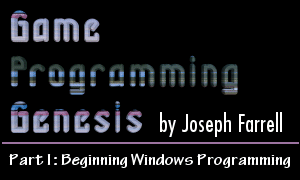11/10 - 11/12 @ Montréal, Canada
12/5 - 12/7 @ Shanghai, China
12/24 - 12/27
2/28 - 3/4 @ San Francisco, CA
More events...
2406 articles in the reference section.
Help us fight cancer!
Join SETI Team GDNet!

|
IntroductionThe purpose of this article is to introduce the very basics of Windows programming. By its end, you should be able to put together a working, albeit simple Windows program. All that is required is a basic knowledge of C. I rarely use C++ extensions in my code. However, since Windows itself is object-oriented, a little knowledge about classes never hurt anyone. If you're not familiar with it, don't worry, you won't need anything complicated, so you should be able to pick up what you need as you go. All of the code examples included have been tested using the Microsoft Visual C++ 6.0 compiler. If you don't have a Win32 C/C++ compiler, this is the one to get. That said, let's get started! Setting UpThe two header files that contain most of the Windows functions you'll need are windows.h and windowsx.h. Make sure you include both in your programs. Aside from that, you'll just be using the standard C headers, like stdio.h, conio.h, and so on. Aside from that, there's one line of code you'll see at the beginning of many Windows programs:
Besides having a cool sound to it, this line excludes some MFC stuff from the Windows header files, to speed up your build time a little bit. Since you're not likely to be using MFC for games programming, it's probably a good idea to use this most of the time. If you've never seen this type of statement before -- a #define directive followed by only a name -- it has to do with something called conditional compilation. Take a look at this example:
If the program containing this code has a line in the beginning that reads #define DEBUG_MODE, then the printf() statement will be compiled. Otherwise, it will be left out. This is a useful way to enable or disable code within your program that helps you track down any logic errors you might have. In the case of WIN32_LEAN_AND_MEAN, its definition is used to remove rarely-used components of the Windows header files. Got it? Good. On to the code... |
|
|
|
|